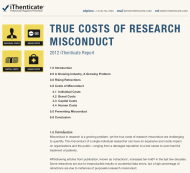Running scientific experiments is, frankly, a pain in the ass. Sure, it's incredibly satisfying when days or weeks of hard work produce a clean-looking result that's easy to interpret. But often as not, experiments simply fail for no obvious reason. Even when they work, the results often leave you scratching your head, wondering "what in the world is that supposed to tell me?"
The simplest solution to these problems is obvious: don't do experiments. (Also, don't go out into the field to collect data, which adds the hazards of injury, sunburn, and exotic disease to the mix.) Unfortunately, data has somehow managed to become the foundation of modern science—so you're going to need to get some from somewhere if you want a career. A few brave souls have figured out a way to liberate data from the tyranny of experimentation: they simply make it up.
Dr. Yoshitaka Fujii seems well on his way to becoming the patron saint of scientific fraudsters, setting a record for the most extensive output of fake data. As near as anyone can work out, Fujii started making up data with abandon some time in the 1990s. By 2000, his fellow researchers were already on to him, publishing
a comment in which they noted, "We became skeptical when we realized that side effects were almost always identical in all groups."
But you can't let such skepticism from your peers slow you down—and Fujii certainly didn't. Even after the comment was published, two different medical schools hired him as a faculty member. He continued to publish, generally using faked data, racking up an eventual record of 200+ bogus papers.
Nobody took any responsibility for investigating the prospect of fraud, despite requests made by other researchers who suspected something was amiss. It took until 2011 for the editors of several journals that were victimized by Fujii to band together and hire an outside investigator, who
found extensive evidence that the data reported by Fujii was unlikely to have resulted from actual experiments. That finally prompted Toho University, his current employer, to launch its
own investigation (PDF). Conclusion: almost none of Fujii's publications were free of falsified data.
Decades of scientific fraud simply shouldn't be this easy. Yet Fujii, along with a few other serial fraudsters, have somehow managed it year after year. In tribute to his staggering success, Ars presents this handy guide on how to get away with faking your data, based on the most popular techniques used in the biggest cases of scientific fraud (so far). Hopefully, it will help answer one of the key questions looming over the Fujii story: In a world of hard data and peer review, just how was such a colossal fraud even possible?







